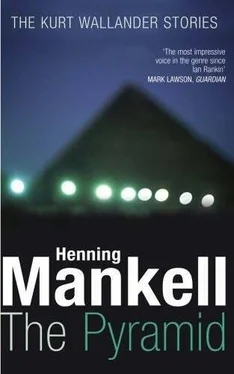'We work too hard,' he said and looked at Björk. 'We have more and more to do. But our numbers have not increased. Sooner or later what happened to Rydberg can happen to all of us.'
'It is a troubling situation,' Björk admitted. 'But we have limited resources.'
For the next half an hour the investigation was set aside. Everyone was shaken and talked about the working conditions. After Björk left the room, the words became sharper. About impossible planning, strange priorities and a continual lack of information.
At around two o'clock, Wallander felt they had to move on. Not least for his own sake. When he saw what had happened to Rydberg he had thought about what could happen to himself. How long would his own heart put up with the strain? All the unhealthy food, the frequently recurring bouts of broken and lost sleep? And, above all, his grief after the divorce.
'Rydberg would not approve of this,' he said. 'That we're wasting time talking about our situation. We'll have to do that later. Right now we have a double murderer to catch. As soon as we possibly can.'
They ended the meeting. Wallander went to his office and called the hospital. He was told that Rydberg was sleeping. It was still premature to expect an explanation for what had happened.
Wallander hung up the phone, and Martinsson walked in.
'What happened?' he asked. 'I've been in Sjöbo. Ebba was all shaken up out there.'
Wallander told him. Martinsson sat down heavily in the visitor's chair.
'We work ourselves to death,' he said. 'And who appreciates it?'
Wallander became impatient. He didn't want to think about Rydberg any more, at least not right now.
'Sjöbo,' he said. 'What do you have for me?'
'I've been out in a variety of muddy fields,' Martinsson replied. 'We've been able to pinpoint the location of those lights quite well. But there were no traces anywhere of either spotlights or marks from a plane landing or taking off. On the other hand, some information has turned up that probably explains why this aeroplane couldn't be identified.'
'And what is it?'
'It simply doesn't exist.'
'What do you mean?'
Martinsson took a while to search through the papers he had taken out of his briefcase.
'According to the records of the Piper factory, this plane crashed in Vientiane in 1986. The owner back then was a Laotian consortium that used it to transport its managers to various agricultural centres around the country. The official cause of the crash was listed as a lack of fuel. No one was injured or killed. But the plane was wrecked and removed from all active registers and from the insurance company, which apparently was a kind of daughter company to Lloyd's. This is what we know after looking up the engine registration number.'
'But that turned out not to be correct?'
'The Piper factory is naturally very interested in what has happened. It's not good for their reputation if a plane that no longer exists suddenly starts to fly again. This could be a case of insurance fraud and other things that we have no idea about.'
'And the men in the plane?'
'We're still waiting for them to be identified. I have a couple of good contacts in Interpol. They've promised to expedite the matter.'
'The plane must have come from somewhere,' Wallander said.
Martinsson nodded.
'That gives us yet another problem. If you refurbish a plane with extra fuel tanks, it's able to fly long distances. Nyberg thinks he may have identified the remains of something that could have been a spare fuel tank. But we don't know yet. If this is the case, the plane could have come from virtually anywhere. At least Britain and Continental Europe.'
'But it must have been observed by someone,' Wallander insisted. 'You can't cross borders with complete impunity.'
'I agree,' Martinsson said. 'Therefore Germany would be an educated guess, because you fly over open water until you reach the Swedish border.'
'What do the German aviation authorities say?'
'It takes time,' Martinsson said. 'But I'm working on it.'
Wallander reflected for a moment.
'We actually need you on this double homicide,' he said. 'Can you delegate this work to someone else? At least while we wait on a positive identification of the pilots, and whether the plane came from Germany?'
'I was about to suggest the same thing,' Martinsson said.
Wallander checked the time.
'Ask Hansson or Svedberg to get you up to speed on the case,' he said.
Martinsson got out of the chair.
'Have you heard from your father?'
'He doesn't call without a good reason.'
'My father died when he was fifty-five,' Martinsson said abruptly. 'He had his own business. A car-repairs shop. He had to work constantly in order to make ends meet. Right when things were starting to look up, he died. He wouldn't have been more than sixtyseven now.'
Martinsson left. Wallander did his best to avoid thinking about Rydberg. Instead he again reviewed everything they knew about the Eberhardsson sisters. They had a likely motive – money – but no trace of the killer. Wallander jotted a few words on his notepad.
The double life of the Eberhardsson sisters?
Then he pushed the pad away. When Rydberg was out, they lacked their best instrument. If an investigative team is like an orchestra, Wallander thought, we've lost our first violinist. And then the orchestra doesn't sound as good.
At that moment he made up his mind to have his own talk with the neighbour who had provided the information about Anna Eberhardsson. Svedberg was often too impatient when he talked to people about what they might have seen or heard. It's also a matter of finding out what people think, Wallander said to himself. He found the name of the neighbour, Linnea Gunnér. Only women in this case, he thought. He dialled her phone number and heard her pick up. Linnea Gunnér was at home and happy to receive him. She gave him the code to the front door of her building and he made a note of it.
He left the station shortly after three o'clock and kicked the damaged hinge again. The dent was getting worse. When he reached the scene of the fire, he saw that the ruins of the building were already in the process of being razed. There were still many curious onlookers gathered around the site.
Linnea Gunnér lived on Möllegatan. Wallander entered the door code and took the stairs to the first floor. The house dated back to the turn of the century and had beautiful designs on the walls of its stairwell. On the door to Gunnér's apartment was posted a large sign about residents not wishing to receive any advertisements. Wallander rang the bell. The woman who opened the door was the opposite of Tyra Olofsson in almost every way. She was tall, with a sharp gaze and a firm voice. She invited him into her apartment, which was filled with objects from all over the world. In the living room there was even a ship's figurehead. Wallander looked at it for a long time.
'This belonged to the barque Felicia, which sank in the Irish Sea,' Linnea Gunnér said. 'I bought it once for an insignificant sum in Middlesbrough.'
'Then you've been at sea?' he asked.
'My whole life. First as a chef, then as a steward.'
She did not speak with a Skåne dialect. Wallander thought she sounded more as if she came from Småland or Östergötland.
'Where are you from?' he asked.
'Skänninge in Östergötland. About as far from the sea as one can get.'
'And now you live in Ystad?'
'I inherited this apartment from an aunt. And I have a view of the sea.'
She had put out coffee. Wallander thought it was probably the last thing his stomach needed. But he still said yes. He had immediately felt he could trust Linnea Gunnér. He had read in Svedberg's notes that she was sixty-six years old. But she appeared younger.
Читать дальше












